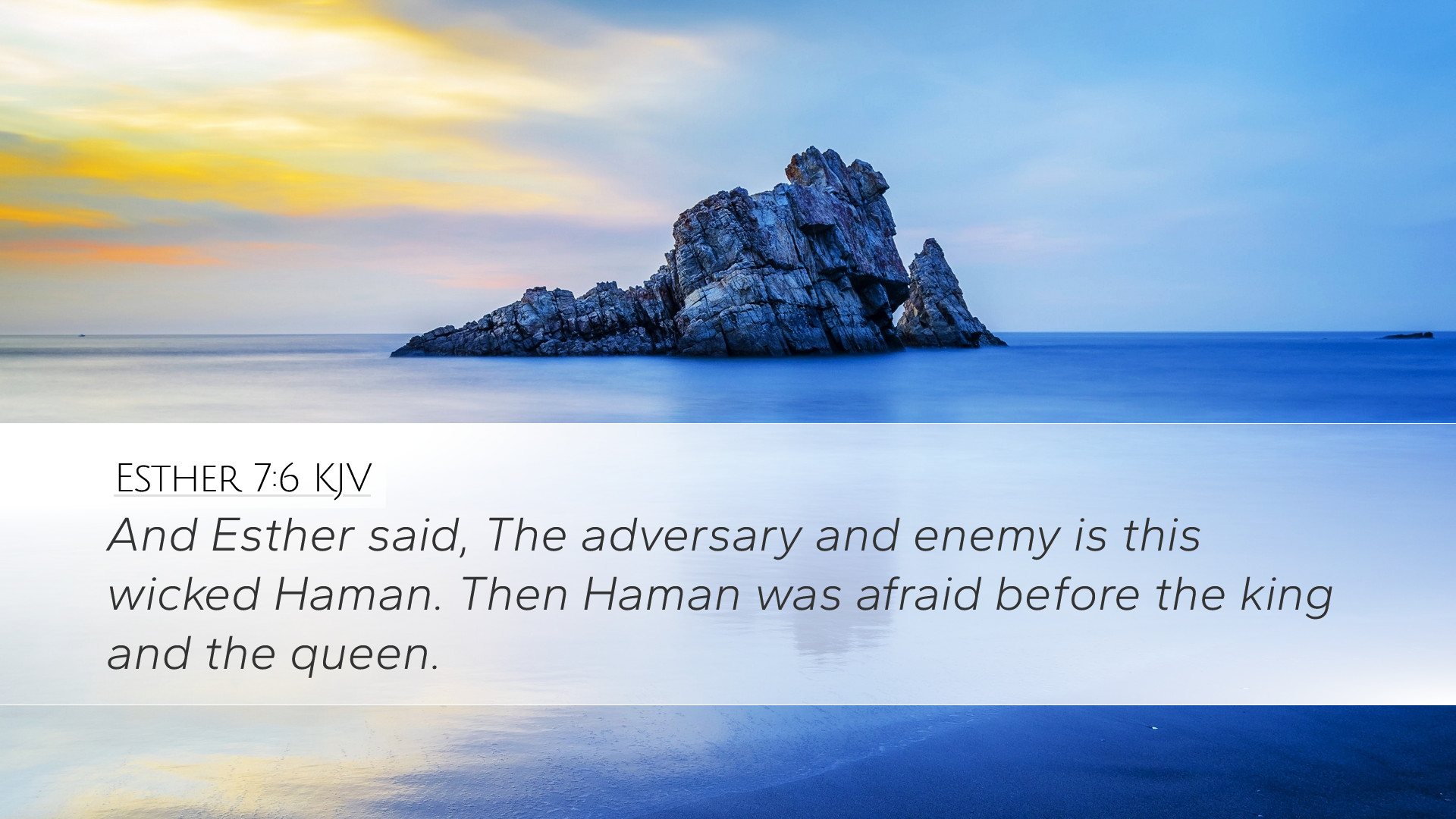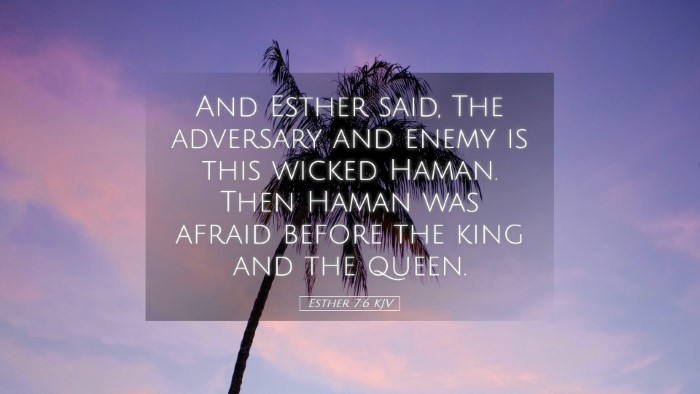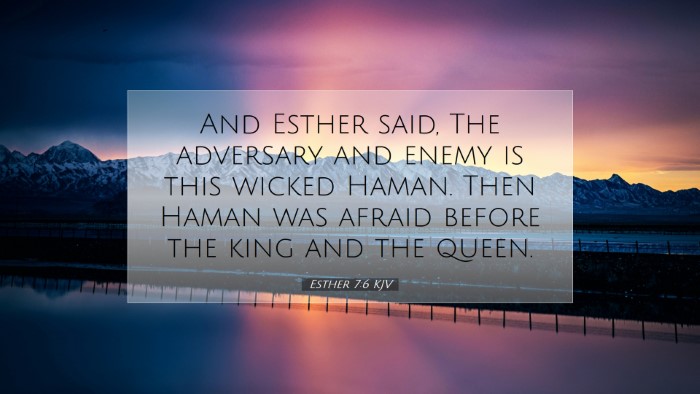Old Testament
Genesis Exodus Leviticus Numbers Deuteronomy Joshua Judges Ruth 1 Samuel 2 Samuel 1 Kings 2 Kings 1 Chronicles 2 Chronicles Ezra Nehemiah Esther Job Psalms Proverbs Ecclesiastes Song of Solomon Isaiah Jeremiah Lamentations Ezekiel Daniel Hosea Joel Amos Obadiah Jonah Micah Nahum Habakkuk Zephaniah Haggai Zechariah MalachiEsther 7:6
Esther 7:6 KJV
And Esther said, The adversary and enemy is this wicked Haman. Then Haman was afraid before the king and the queen.
Esther 7:6 Bible Commentary
Commentary on Esther 7:6
Verse: Esther 7:6 - "And Esther said, The adversary and enemy is this wicked Haman. Then Haman was afraid before the king and the queen."
Introduction
The book of Esther, a narrative of God’s providence, emphasizes the preservation of the Jewish people amidst adversity. In chapter 7, tension escalates as Esther reveals Haman's plot against her people. This commentary will draw from the insights of Matthew Henry, Albert Barnes, and Adam Clarke, providing a comprehensive understanding of Esther 7:6.
Contextual Analysis
Esther’s revelation in this verse is the climax of a series of events marked by deceit and danger. Haman, who has secured the favor of King Ahasuerus, has plotted to annihilate the Jews. Esther, having been divinely placed in her position, must now confront this wicked man.
Insights from Matthew Henry
Matthew Henry highlights the courage and wisdom of Esther in this moment. He notes how Esther strategically reveals Haman’s identity as the adversary. Her public declaration not only brings clarity to the king but also underscores Haman's villainy in stark contrast to her own nobility.
Henry also points out that Esther’s accusation of Haman is underscored by her calmness. She speaks with authority and clarity, suggesting that those who trust in God are not easily shaken, even in perilous circumstances.
Insights from Albert Barnes
Albert Barnes emphasizes the judgment of Haman following Esther’s revelation. Haman’s fear reflects not only personal guilt but also an awareness of divine justice. Barnes articulates how this fear is indicative of the inevitable consequences that arise from one’s wickedness.
Furthermore, Barnes draws attention to the role of the king's authority in this scene. Upon hearing Esther’s words, Ahasuerus is positioned to act, showcasing the significant interplay between human authority and divine providence. The moment signifies a divine turning point, where the oppressed find favor and the oppressors face judgment.
Insights from Adam Clarke
Adam Clarke offers a detailed view of the psychological dimensions of the passage. He remarks on Haman’s dread, which is fitting given the gravity of his actions. Clarke elucidates that such fear serves as a natural response to impending retribution, a theme recurrent throughout the scriptures.
Clarke also depicts Esther’s response as a matter of justice, where she stands not only for her own people but also upholds a standard of righteousness. Her engagement in this moment serves to illustrate the necessity of standing against evil and speaks volumes to the role of advocacy and intercession.
Theological Implications
- Divine Sovereignty: The events in Esther remind us that God’s sovereign hand guides history, working through human actions to fulfill His purposes.
- The Nature of Evil: Haman's scheme epitomizes hubris and malice, serving as a poignant reminder of the corrupt nature present in humanity.
- Advocacy and Courage: Esther embodies what it means to act with courage in the face of potential peril, advocating for those who cannot defend themselves.
Practical Applications
- Believers are encouraged to recognize God’s providence in their lives. The story reflects that even in the darkest moments, God's plan is at work.
- The importance of speaking truth to power is evident in Esther’s actions. This serves as a call to Christians for boldness in declaring the truth, especially in challenging times.
- Engaging in justice and standing against oppression is a fundamental aspect of the faith journey. Esther serves as a model for both courage and strategic action in confronting evil.
Conclusion
Esther 7:6 serves as a pivotal moment in the narrative, encapsulating themes of justice, fear, and divine intervention. The insights gleaned from Matthew Henry, Albert Barnes, and Adam Clarke offer a multifaceted view of the verse, enriching our understanding of Scripture. Within this verse lies a powerful reminder of the faithfulness of God in adversity and the courage required to confront darkness with light.


